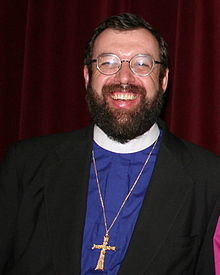VICTORIA, BC: Condemnation of Anglican orders by Rome is political, says UECNA Archbishop
By David W. Virtue in Victoria, BC
www.virtueonline.org
June 3, 2011

(Ultrajectine thought holds to the words of St. Vincent of Lerins: "We must hold fast to that faith which has been held everywhere, always, and by all the faithful." Ultrajectine thought rejects papal infallibility and holds to the belief that only the Church in Ecumenical Council may speak infallibly.)
In an address made available to the Congress of Traditional Anglicans in Victoria, BC, Robinson noted that the recent fiasco over the ordinariates has demonstrated that a reversal of Rome's stated position on Anglican orders is not going to occur to satisfy the relatively small numbers of Anglo-Papalists joining the ordinariates.
"I have absolutely no doubts about the validity of Anglican Orders. Our ordinal, even in the form set forth in 1559, is perfectly sufficient for the proper transmission of Holy Orders in that it contains the name of the order to which the candidate(s) is to be ordained, appropriate prayers, the laying on of hands, and the invocation of the Holy Spirit - all within the context of the Eucharist. This is all that is required according to the Biblical and Patristic witness, and sufficient to ensure the proper transmission of Orders and of the apostolic Succession," continued Robinson.
The archbishop remarked that the Roman refusal to recognize Anglican Orders boils down to a manifestation of the "not made here" syndrome. Because the Anglican Church came about, in the opinion of Rome, with an act of open defiance of the Pope, its orders must be regarded as invalid in order to reduce us to the same status as the other churches of the Reformation.
Robinson believes the Roman claims to authority over the whole Church depend upon a single questionable text in the New Testament, "Thou art Peter and upon this Rock I will build my Church."
"The famous 'Tu es Petrus' text which you will find inscribed on the inside of the drum of the dome of St. Peter's Basilica in Rome is apparently a simple assertion of Christ's appointment of Peter as the Rock on which His Church would be built. Or is it?
"When one looks at the Early Fathers a majority of them see the 'Tu es Petrus' text as referring not to Peter personally but to his confession of faith that Jesus is 'the Christ.' "Those who tend to see the 'thou art Peter' text as justifying Papal claims tend to be western Christians, if not actually Roman Christians. This single text is not much to build on, especially when one examines the position of Peter in the Apostolic band in the Book of Acts. It would seem that the Apostles collectively, and not just Peter himself, was seen as the central authority within the Church. Even Peter himself submitted some matters, such as the conditions for the admission of the Gentile into the Church, to them for judgment (Acts 11). The pattern of decision making is clearly conciliar.
"It would seem that there is no sound Scriptural argument for saying that any unique additional authority attaches to St. Peter or to the See of Rome that was not in some sense shared with James and John, and most likely, with the other Apostles. St. Peter's presence, imprisonment and martyrdom in Rome are not attested to in Scripture, but in ancient and wide spread tradition. There is certainly no evidence that he was Bishop of Rome, that title may, in fact, belong to Linus or perhaps Cletus as it seems Rome may have been slow to adopt a monarchical episcopate.
"Apart from a torturous reading of the 'Tu es Petrus' passage there is nothing that links the Primacy to Peter - indeed St. James seems to have been regarded as more of a 'Primate' in the book of acts - and still less tie to the Primacy of Rome. Therefore one must conclude that Roman Primacy - never mind Universal Jurisdiction or Infallibility - do not rest on Scripture. Being incapable of Biblical proof it cannot be required to be believed as a doctrine necessary for salvation, which is, of course, exactly what the modern Roman Church requires."
Robinson contends that claims that a unique Apostolic Authority resides in the Roman Pontiff alone are questionable, to say the least. "Our oldest sources see Apostolic authority residing in the bishops of the church as a whole. This position is supported by the fact that major doctrinal decisions in the Early Church are entrusted to Councils of Bishops called by the Emperor. The invitation to these councils went to all the bishops in Communion with the one, holy, catholic and apostolic church, and although only a percentage responded to the Emperor's invitation the decisions and Canons of the Councils were received by the whole Church, thus becoming ecumenical."
END













